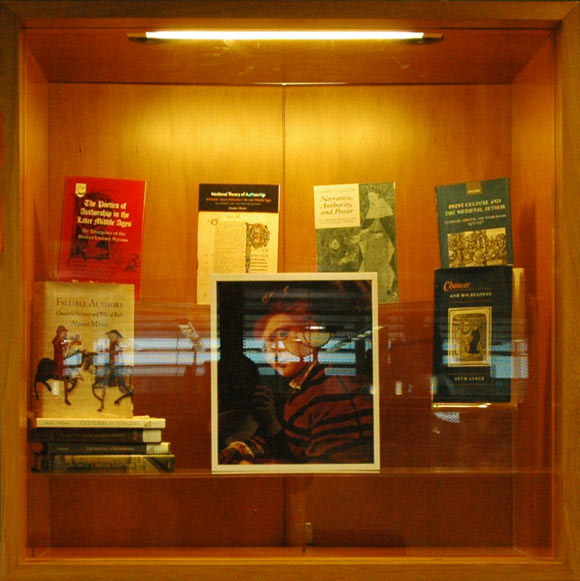Vitrine Three: Medieval Authorship

Analysis of authorship in medieval literary scholarship has long been impacted upon by an assumption, reinforced by Barthes and Foucault, that the concept of the individual is a Renaissance invention. Colin Morris effectively dismissed this idea in his book The Discovery of the Individual, in 1972, but a residue has remained, demanding further analyses of medieval authorship in its own right.
Colin Morris, The Discovery of the Individual, 1050-1200 (New York: Harper & Row, 1972) Storage B824.MV55
Alastair Minnis, Medieval Theory of Authorship (Philadelphia: University of Pennsylvania Press, 2010) Central PN45.MN17
Alastair Minnis, Fallible Authors (Philadelphia: University of Pennsylvania Press, 2008) Central PR1868.P33 MN17
Daniel Hobbins, Authorship and Publicity Before Print (Philadelphia: University of Pennsylvania Press, 2009)
Larry Scanlon, Narrative, Authority, and Power (Cambridge: Cambridge University Press, 1994) Central PR311.S871
Alexandra Gillespie, Print Culture and the Medieval Author (Oxford: Oxford University Press, 2006) Central Z151.3.GF58
Burt Kimmelman, The Poetics of Authorship in the later Middle Ages (New York: Peter Lang, 1996) Central PN688.KG4
Nicholas Watson, Richard Rolle and the Invention of Authority (Cambridge: Cambridge University Press, 1991) Central PR2136.WA58
Seth Lerer, Chaucer and his Readers: Imagining the Author in Late-Medieval England (Princeton, N.J.: Princeton University Press, 1993) Central PR1924.LL19
Cultures of Forgery: Making Nations, Making Selves, edited by Judith Ryan and Alfred Thomas (New York: Routledge, 2003) Central NX636.CY79

